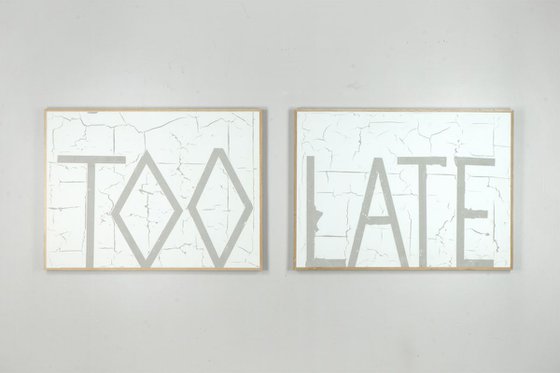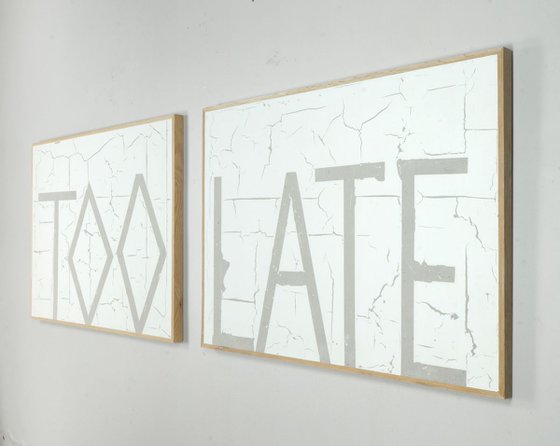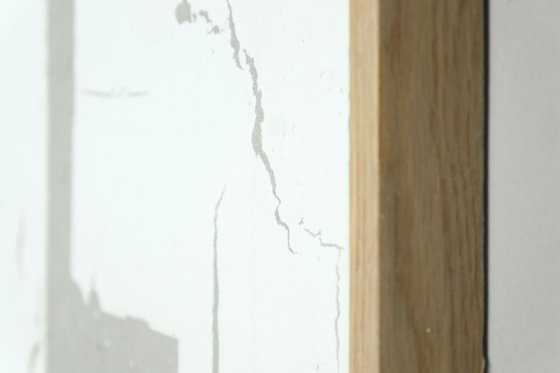- By medium
- By subject
- By budget
- Sales
- Gift cards
- Discover all art
- Artists
- Editors’ picks
- Ideas
Original artwork description:
About the series
A word is always also an image. Language connects to categories and clusters of information that projects an internal image when triggered. In thats sense they are no different than regular perception. What we see is images constructed inside the mind. We never perceive reality objectively or in itself. Perception is interpretation and thus language, as is also words naturally.
But as vision usually stems from a physical reality so does words, written or spoken. Nothing can ever be communicated without being inscribed into matter of some sort. Matter is what connects us, without it we would be completely sealed off. How, or in what way, words are inserted into reality affects how we perceive them. Thus reality itself seeps into language. There exists no clear or unmediated communication. Matter adds to the message. Because which matter we choose to communicate through reflects on who we are, it can also help to reveal unconscious or hidden meanings.
The first written words were inscribed in stone or clay. One of the purposes was to save them for the future. To protect them from the volatility of time. To speak, or to write, is always to some extent, an act of power. The receiver must always initially submit his or hers attention to the message. No matter how small, the message will always change the receiver forever. The reception can, and will, be processed by the receiver, but he or she, will never be same as before. It is no coincident that many of the first examples of texts are curses, prayers or laws. Different ways of trying to influence reality.
About the work
One of the problems with time is that we can never really grasp the present. The moment of now is always illusive. When we talk about "being in the moment", or "being present", it usually means leaving our self awareness. When we sink into an activity, or drift away in our minds, we are in a way the opposite of present. We are unaware of everything around us. To be present in the moment, we have to loose ourselves. On the other hand, when we are self aware, present as in reflecting upon our surroundings, we often feel that something is missing. We are not really there, or 100% in it. The special moment has passed or not yet showed up. All that we are left with is dreams and memories.
The western capitalistic society is obsessed with the present. To have value, everything has to be new, or connected to the now, like a short term sale, or a sudden and temporary interest when something comes "in style", or goes viral. Youth is a fetish because its fleeting. Profits has to ever increase. All that is stable and durable is suppressed. The industries of "mindfulness" and "creativity" can perhaps paradoxically be perceived as a part of this. We are supposed to stay in the moment, and be ever present. Self awareness and reflection is exchanged with the quick fixes of self help guidebooks, body exercise and meditation. The demand is to be present and enjoy. This is ideology. When we enjoy ourselves, we are unaware. This is pleasant but not a good foundation for change. It is one of the reasons why capitalism persevere despite that it benefits only a small minority.
The questions "When will we be free, when will we have equality, when is it time for change?", always has two answers - "Not yet", or - "Too late". Not yet, because the economy is bad, or it's not bad enough. Because people are busy, or they are pacified. Too late, because we lost our innocence. Before we were naive and believed, now we are too comfortable or cynical and afraid. Too late, because we tried it and it didn't work. Because capitalism is natural and we have arrived at our destination. History is over. There is only the now.
Capitalism is never interested in the future or the past. To end it, we must realise that there is never a right moment for change. The revolution is whenever it happens. And when it happens it will already be over. There will be no turning back.
ALWAYS and ALREADY are twin works. They should be read together. Always-already is a term used to describe the fact that an event in time forever changes everything coming after, even if the event passes unnoticed and the realisation of the consequences of it arises long after. It can be used in understanding free will, through the western concept of love. We need love to be a matter of choice, of free will. But if we really set out to choose who we were going to love, it doesn't work either. It is only once we fallen in love, that we retroactively can say that we have chosen the recipient for our love. The choice is never present, it is always-already made.
The term is also useful in understanding the concept of ideology. Ideology is at work in all institutions of society, so when we grow up as individuals, we are also always-already subjects to ideology. In the case of capitalism it is specially relevant. Even if capitalism developed under the industrialisation of the nineteenth century it's exponents present it as, not only ever lasting, but also as always-already here. They proclaim its foundation is in the human nature - survival of the fittest, personal freedom etc. The invisible hand of the marked is treated like it's a law af nature. But even if these concepts are questionable, one should be careful not to think that ideology hides the true nature of the things, and that you can fight it by "lifting the veil" and expose reality as it really is. Ideology is always-already inscribed in reality through language itself. Without language, or symbolisation, we cannot perceive anything at all. We wouldn't even be self aware. Precisely as there is no magic, only magic tricks, what ideology does is that it leads attention to one truth, while another one operates unnoticed. For example, capitalism talks about the right to pursuit happiness, while it facilitates the right to exploitation. So we simply can't take away ideology, we have to replace one with another. This might seem like a hopeless task, but it is definitely not impossible. When you read what is actually written on the two works it spells - "Not Yet Too Late".
Materials used:
Filler (coarse and fine) in oak frame
Tags:
#abstract #painting #minimalism #graphic #tactile #filler #oak frame #cementAlready (2018) Painting
by Johan Söderström
1 Artist Reviews
£1,882.54 Sold
- Painting on Other
- One of a kind artwork
- Size: 250 x 80 x 5cm (framed)
- Framed and ready to hang
- Signed on the back
- Style: Abstract
- Subject: Abstract and non-figurative
Do you like this artwork?
This artwork has sold, but the artist is accepting commission requests. Commissioning an artwork is easy and you get a perfectly personalised piece.
Loading
Original artwork description
About the series
A word is always also an image. Language connects to categories and clusters of information that projects an internal image when triggered. In thats sense they are no different than regular perception. What we see is images constructed inside the mind. We never perceive reality objectively or in itself. Perception is interpretation and thus language, as is also words naturally.
But as vision usually stems from a physical reality so does words, written or spoken. Nothing can ever be communicated without being inscribed into matter of some sort. Matter is what connects us, without it we would be completely sealed off. How, or in what way, words are inserted into reality affects how we perceive them. Thus reality itself seeps into language. There exists no clear or unmediated communication. Matter adds to the message. Because which matter we choose to communicate through reflects on who we are, it can also help to reveal unconscious or hidden meanings.
The first written words were inscribed in stone or clay. One of the purposes was to save them for the future. To protect them from the volatility of time. To speak, or to write, is always to some extent, an act of power. The receiver must always initially submit his or hers attention to the message. No matter how small, the message will always change the receiver forever. The reception can, and will, be processed by the receiver, but he or she, will never be same as before. It is no coincident that many of the first examples of texts are curses, prayers or laws. Different ways of trying to influence reality.
About the work
One of the problems with time is that we can never really grasp the present. The moment of now is always illusive. When we talk about "being in the moment", or "being present", it usually means leaving our self awareness. When we sink into an activity, or drift away in our minds, we are in a way the opposite of present. We are unaware of everything around us. To be present in the moment, we have to loose ourselves. On the other hand, when we are self aware, present as in reflecting upon our surroundings, we often feel that something is missing. We are not really there, or 100% in it. The special moment has passed or not yet showed up. All that we are left with is dreams and memories.
The western capitalistic society is obsessed with the present. To have value, everything has to be new, or connected to the now, like a short term sale, or a sudden and temporary interest when something comes "in style", or goes viral. Youth is a fetish because its fleeting. Profits has to ever increase. All that is stable and durable is suppressed. The industries of "mindfulness" and "creativity" can perhaps paradoxically be perceived as a part of this. We are supposed to stay in the moment, and be ever present. Self awareness and reflection is exchanged with the quick fixes of self help guidebooks, body exercise and meditation. The demand is to be present and enjoy. This is ideology. When we enjoy ourselves, we are unaware. This is pleasant but not a good foundation for change. It is one of the reasons why capitalism persevere despite that it benefits only a small minority.
The questions "When will we be free, when will we have equality, when is it time for change?", always has two answers - "Not yet", or - "Too late". Not yet, because the economy is bad, or it's not bad enough. Because people are busy, or they are pacified. Too late, because we lost our innocence. Before we were naive and believed, now we are too comfortable or cynical and afraid. Too late, because we tried it and it didn't work. Because capitalism is natural and we have arrived at our destination. History is over. There is only the now.
Capitalism is never interested in the future or the past. To end it, we must realise that there is never a right moment for change. The revolution is whenever it happens. And when it happens it will already be over. There will be no turning back.
ALWAYS and ALREADY are twin works. They should be read together. Always-already is a term used to describe the fact that an event in time forever changes everything coming after, even if the event passes unnoticed and the realisation of the consequences of it arises long after. It can be used in understanding free will, through the western concept of love. We need love to be a matter of choice, of free will. But if we really set out to choose who we were going to love, it doesn't work either. It is only once we fallen in love, that we retroactively can say that we have chosen the recipient for our love. The choice is never present, it is always-already made.
The term is also useful in understanding the concept of ideology. Ideology is at work in all institutions of society, so when we grow up as individuals, we are also always-already subjects to ideology. In the case of capitalism it is specially relevant. Even if capitalism developed under the industrialisation of the nineteenth century it's exponents present it as, not only ever lasting, but also as always-already here. They proclaim its foundation is in the human nature - survival of the fittest, personal freedom etc. The invisible hand of the marked is treated like it's a law af nature. But even if these concepts are questionable, one should be careful not to think that ideology hides the true nature of the things, and that you can fight it by "lifting the veil" and expose reality as it really is. Ideology is always-already inscribed in reality through language itself. Without language, or symbolisation, we cannot perceive anything at all. We wouldn't even be self aware. Precisely as there is no magic, only magic tricks, what ideology does is that it leads attention to one truth, while another one operates unnoticed. For example, capitalism talks about the right to pursuit happiness, while it facilitates the right to exploitation. So we simply can't take away ideology, we have to replace one with another. This might seem like a hopeless task, but it is definitely not impossible. When you read what is actually written on the two works it spells - "Not Yet Too Late".
Materials used:
Filler (coarse and fine) in oak frame
Tags:
#abstract #painting #minimalism #graphic #tactile #filler #oak frame #cement14 day money back guaranteeLearn more



